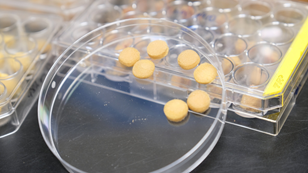Eco-friendly pollen sponge to tackle water contaminants
Scientists at NTU Singapore have created a reusable, biodegradable sponge that can readily soak up oil and other organic solvents from contaminated water sources.
To make the sponge, the research team first transformed tough pollen grains into a soft gel-like material, before freeze-drying the material. These processes resulted in the formation of pollen sponges with 3D porous architectures. Credit: NTU Singapore
SINGAPORE — A team of scientists led by Nanyang Technological University, Singapore (NTU Singapore) has created a reusable, biodegradable sponge that can readily soak up oil and other organic solvents from contaminated water sources, making it a promising alternative for tackling marine oil spills.
Made of sunflower pollen, the sponge is hydrophobic—it repels water—thanks to a coat of natural fatty acid on the sponge. In lab experiments, the scientists showed the sponge’s ability to absorb oil contaminants of various densities, such as gasoline and motor oil, at a rate comparable to that of commercial oil absorbents.
Oil spills are difficult to clean up, and result in severe long-lasting damage to the marine ecosystem. Conventional clean-up methods, including using chemical dispersants to break oil down into very small droplets, or absorbing it with expensive, unrecyclable materials, may worsen the damage.
So far, the researchers have engineered sponges that measure 5 cm in diameter. The research team, made up of scientists from NTU Singapore and Sungkyunkwan University in South Korea, believes that these sponges, when scaled up, could be an eco-friendly alternative to tackle marine oil spills.
Professor Cho Nam-Joon from the NTU School of Materials Science and Engineering, who led the study, said: “By finetuning the material properties of pollen, our team successfully developed a sponge that can selectively target oil in contaminated water sources and absorb it. Using a material that is found abundantly in nature also makes the sponge affordable, biodegradable, and eco-friendly.”
This study builds on NTU’s body of work on finding new uses for pollen, known as the diamond of the plant kingdom for its hard exterior, by transforming its tough shell into microgel particles. This soft, gel-like material is then used as a building block for a new category of environmentally sustainable materials.
Last year, Prof Cho, together with NTU President Professor Subra Suresh, led a research team to create a paper-like material from pollen as a greener alternative to paper created from trees. This ‘pollen paper’ also bends and curls in response to changing levels of environmental humidity, a trait that could be useful for soft robots, sensors, and artificial muscles.
Prof Cho, who also holds the Materials Research Society of Singapore Chair in Materials Science and Engineering, added: “Pollen that is not used for plant pollination is often considered biological waste. Through our work, we try to find new uses for this ‘waste’ and turn it into a natural resource that is renewable, affordable, and biodegradable. Pollen is also biocompatible. It does not cause an immunological, allergic or toxic reaction when exposed to body tissues, making it potentially suitable for applications such as wound dressing, prosthetics, and implantable electronics.
https://www.waterworld.com/wastewater/treatment/press-release/14201380/ecofriendly-pollen-sponge-to-tackle-water-contaminants







